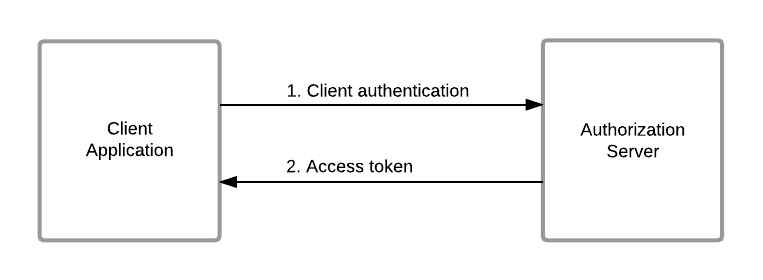Client Credentials Grant¶
Client credentials can be used when the authorization scope is limited to the protected resources belonging to the client. Client credentials are used as an authorization grant when the client requests access to protected resources based on an authorization previously arranged with the authorization server. The client application requests an access token from the authorization server, authenticating the request with its client key and client secret. If the client is successfully authenticated, an access token is returned.
For a detailed explanation on this grant type, go to the MWARE IAM.
Flow¶
The client can request an access token using only its client credentials with this grant type. It is similar to the resource owner password credentials grant type, except in this case, only the client’s credentials are used to authenticate a request for an access token.
Invoking the Token API to generate the tokens¶
Step 1 - Access the ESB Developer Portal¶
Sign in to the ESB Developer Portal (https://<hostname>:9443/devportal).
Step 2 - Enable the Client Credentials grant type¶
Follow the instructions below to make sure that the Client Credentials grant type is enabled:
- Click Applications and click on the respective application name.
-
Click Production Keys or Sandbox Keys based on the environment that you wish to work with.
Let's click Production Keys.
-
Click OAuth2 Tokens to navigate to the OAuth2 Keys page.
- Navigate to the Grant Types section, which is under the Key Configurations section.
-
Select Client Credentials.
Step 3 - Get a valid consumer key and consumer secret pair¶
- Navigate back to the OAuth2 Keys page (in case you have navigated away from it).
- Click GENERATE KEYS to generate the Production keys.
Step 4 - Encode the consumer key and consumer secret pair¶
Combine the consumer key and consumer secret key in the format consumer-key:consumer-secret and encode the combined string using base64.
Step 5 - Obtain the access token¶
Use either one of the following sample cURL commands for this purpose.
Obtain the access token without specifying the scope¶
curl -k -d "grant_type=client_credentials" -H "Authorization: Basic <Base64-encoded-client_key:client_secret>" -H "Content-Type: application/x-www-form-urlencoded" https://localhost:<https-port>/token -vcurl -k -d "grant_type=client_credentials" -H "Authorization: Basic cEJ6dUlaaEdwaGZRbWRjVVgwbG5lRmlpdXh3YTo0U0pnV19qTU56aGpIU284OGJuZVhtTnFNMjRh" -H "Content-Type: application/x-www-form-urlencoded" https://localhost:9443/oauth2/token -vResponse
> POST /token HTTP/1.1
> Host: localhost:8243
> User-Agent: curl/7.54.0
> Accept: */*
> Authorization: Basic cEJ6dUlaaEdwaGZRbWRjVVgwbG5lRmlpdXh3YTo0U0pnV19qTU56aGpIU284OGJuZVhtTnFNMjRh
> Content-Type: application/x-www-form-urlencoded
> Content-Length: 29
< HTTP/1.1 200 OK
< X-Frame-Options: DENY
< Cache-Control: no-store
< X-Content-Type-Options: nosniff
< Pragma: no-cache
< X-XSS-Protection: 1; mode=block
< Content-Type: application/json
< Date: Thu, 18 Jan 2018 12:54:32 GMT
< Transfer-Encoding: chunked
{"access_token":"4c27f899-6f9c-3217-b974-3ceb5a409ac3","scope":"am_application_scope default","token_type":"Bearer","expires_in":723}Obtain the access token by specifying a scope¶
curl -k -d "grant_type=client_credentials&scope=test" -H "Authorization: Basic <ConsumerKey:ConsumerSecret>" -H "Content-Type: application/x-www-form-urlencoded" https://localhost:9443/oauth2/tokencurl -k -d "grant_type=client_credentials&scope=test" -H "Authorization: Basic cEJ6dUlaaEdwaGZRbWRjVVgwbG5lRmlpdXh3YTo0U0pnV19qTU56aGpIU284OGJuZVhtTnFNMjRh" -H "Content-Type: application/x-www-form-urlencoded" https://localhost:9443/oauth2/tokenAdditional information¶
Disabling the Client Credentials grant type¶
If you want to disable the Client Credentials grant type in the API-M instance, add the following entry to the deployment.toml file in the <API-M_HOME>/repository/conf/ folder.
[oauth.grant_type.client_credentials]
enable = falseRefresh Token grant type - supported or not¶
The Client Credentials grant type does not support the Refresh Token grant type. This grant type does not issue a refresh token which can be used to obtain new access tokens using the refresh token grant.
Top
